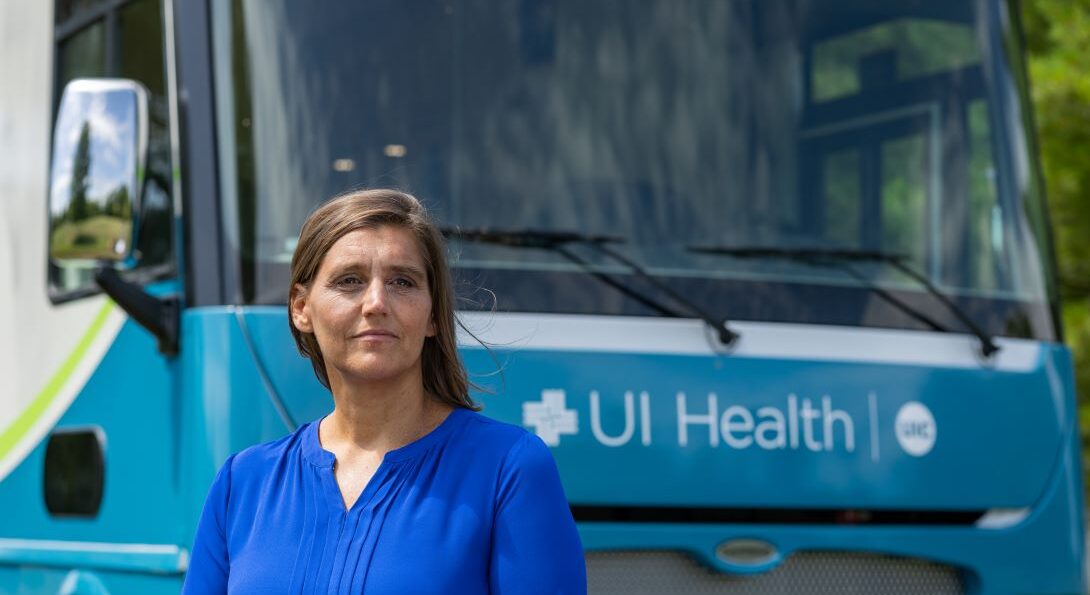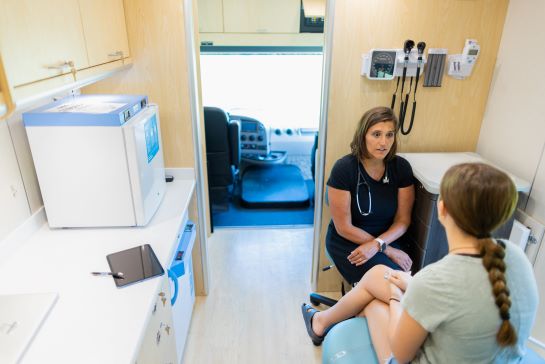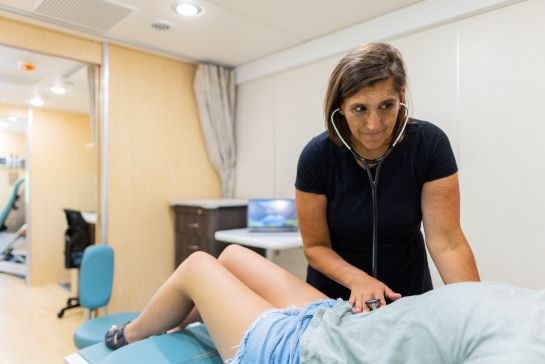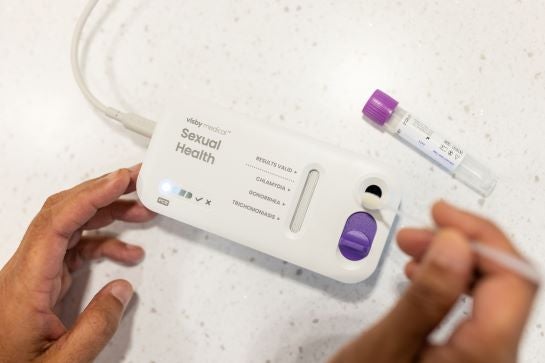The road less traveled

A UI Health mobile unit, run by the College of Nursing, will bring care to rural parts of Illinois.
body copy

Summer Park can do a lot as a board-certified family nurse practitioner. She can test for sexually transmitted infections and screen for high blood pressure. She can do pap smears, provide birth control options, and test for elevated blood sugar. She can examine, diagnose and treat patients from birth to death.
But there’s one thing she can’t do.
“Driving a 38-foot RV is not in my scope of practice,” jokes the UIC Nursing clinical assistant professor. “It’s like a school bus.”
That 38-foot RV is a mobile health unit—a tricked-out clinic on wheels—which Park, DNP, FNP-BC, will be riding (but not driving) as the lead practitioner and operations manager. The mobile health unit’s mission is to bring much-needed health care services to teens and young adults in rural parts of Illinois, starting with Peoria County, where Park lives.
“If you’re talking about people who are unhoused, or people who just have no access to health care, having a mobile health unit to go to them is essentially like street medicine, but instead of popping up a tent, we can actually bring a bus with all the amenities of a brick-and-mortar clinic,” Park says.
The project is fueled with a $3.1 million grant from the Health Resources and Services Administration, awarded to clinical associate professor Kelly Rosenberger, DNP ’12, CNM, WHNP-BC, FAANP. Rosenberger, a UIC Nursing-Rockford faculty member and certified nurse-midwife, says the grant is focused on her twin passions: reproductive health and rural health.
The overarching project is called ENRICH, Enhancing Nursing Education and Retention by Initiation of Care Delivered by Mobile Health Units. ENRICH also includes the creation of a Rural Nursing Certificate Program for UIC Nursing graduate students and a Healthy Teens mobile app, which provides comprehensive, evidence-based information on anatomy, communication, STIs, birth control and pregnancy.
“We’re trying to improve health equity by improving access to services for people in rural and underserved areas,” Rosenberger says. “We’re going to them to reach them because what we’re seeing is that only about 48% of people in rural areas seek out health care, compared to about 85% across the U.S. That’s a big difference.”
Power of partnership

Step into one of the two fully functioning patient rooms on the mobile health unit, close the partition, and it’s like being in any clinic exam room—albeit slightly tighter quarters. There’s a functioning sink, an adjustable exam table, and tools to check vitals mounted to the walls.
“If I were working at a traditional clinic, this is what my exam room would look like,” Park says.
Students in UIC’s Doctor of Nursing Practice program will be able to gain clinical hours on the mobile unit. With six campuses throughout Illinois, this aligns with UIC Nursing’s goal of providing high-quality nursing education across the state.
The mobile health unit took its maiden voyage on Aug. 26 to the main offices of Jolt Harm Reduction, a Peoria-based organization that provides naloxone distribution, overdose prevention, and other harm-reduction services.
The central Peoria location and Jolt’s recovery center in Peoria’s North Valley receive foot traffic from some of the most high-risk individuals in the Peoria community, says Chris Schaffner, executive director of Jolt.
“A lot of these folks are unsheltered or unstably housed,” says Schaffner. “They struggle with chaotic substance use. They’re engaged in sex work as a means of survival or out of desperation. They live with co-morbidities. We want to be able to put care in proximity to where those folks travel.”
Park says partnering with familiar community organizations like Jolt will be crucial to making inroads in the community, as some patients may have a distrust of medical institutions.
Game-changer

One of the most immediate problems Park and her team will be able to tackle is sexually transmitted diseases in Peoria county, where rates are some of the highest in the state.
“STIs are everywhere,” Park says. “They’re in rural communities just like in urban communities.”
Chlamydia and gonorrhea rates in Peoria County are well above the national average. Chlamydia infections among 15- to 19-year-olds are more Syphilis cases are climbing rapidly, with 112 new cases in 2023, a 46% increase from the year before and a 75% increase from 2020.
“I think [the mobile health unit] could be a real game-changer,” says Schaffner. “We’re seeing those [STIs] falling along racial lines. [These patients are in] medically underserved communities and impoverished zip codes, which tend to be more segregated. They have less access to resources and education and treatment. We can fill those gaps by having [the mobile health unit] post up in those locations.”
One of the mobile health unit’s biggest benefits is the rapid, point-of-care testing available for female patients.
Park says the unit can conduct gonorrhea, chlamydia and trichomoniasis testing in 30 minutes. Syphilis and HIV tests take only 15 minutes. This means that a medical assistant can run testing while Park or her DNP student takes vitals and a health history in one of the on-unit exam rooms.
Because patients will find out the results while still at their appointment, Park can then send a prescription to a pharmacy immediately, or possibly even treat them with medication contained in a medical fridge and freezer on the unit, if the medication is available.
Ultimately, as the mobile health unit begins to gain recognition in Peoria, the hope is that it can begin traveling to even smaller, more rural communities. Transportation is a significant barrier for patients, and often they don’t want to lose a day of work to travel to seek medical care.
“Rural communities lack access,” Park says. “They just can’t access the health care system, so this allows us to bring confidential and culturally sensitive care to them.”